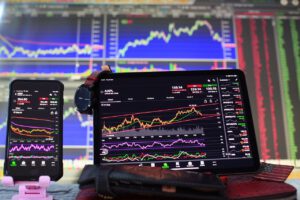Logic Produces Gradual Change, Emotion Produces Rapid Change

Say that you were studying for a Ph.D. in history. Over a number of years, your knowledge of the subject would increase. Week by week, month by month, year by year, you would come to know more. Your knowledge level would not charge forward in sudden, explosive bursts. You would slowly but surely accumulate additional knowledge. The advances would be orderly and measured and consistent and reliable.
Q1 2022 hedge fund letters, conferences and more
That’s how logical, rational advances operate. That’s how stock market prices would operate if the market really were efficient, as the Buy-and-Holders believe. Investors would study the underlying companies and adjust their thinking as to the proper value of those companies as new information became available to them. Prices would move upward or downward in orderly and measured and consistent and reliable ways. The price changes would reflect the economic developments taking place in understandable ways.
That is not how stock prices change over time. Investment analysts frequently offer explanations of stock price changes that are rooted in economic changes. These explanations foster the widespread belief that it is economic developments that are the primary cause of stock price changes. But the reality is that the size of the price change that is being explained is often much greater than or much less than what should have followed from the economic development being offered as an explanation of it.
An Investor's Emotions
Economic developments really are part of the cause of price changes. Stock investors really are in part rational. But they are not entirely rational, as the Buy-and-Holders presume them to be. Economic developments often serve as an impetus for investors to push prices up or down for primarily emotional reasons. Economic developments are often not the drivers for stock price changes but excuses for irrational, emotional considerations to run wild.
Say that you became involved in a romantic relationship. Your understanding of the relationship would change over time, as your understanding of the subject of history changed when you were studying for a Ph.D. But the nature of changes that would take place would be entirely different. Instead of seeing slow and steady progress over time, there would be moments when your appreciation of the romantic partner would increase dramatically in a short amount of time and other moments when your confidence in the romantic partner would be dramatically compromised in a short amount of time. Emotional “knowledge” advances and retreats in stunning breaks forwards and backwards.
Another way of saying it is that emotions experience what in the stock market we refer to as “bull markets” and “bear markets.” Stock investing is not primarily an intellectual endeavor. It is primarily an emotional endeavor with intellectual considerations playing a significant but non-dominant role.
To some degree, everyone acknowledges this. I don’t believe that the most hardened Buy-and-Holder would argue that the most out-of-control bulls or the most out-of-control bears are the product of detached rational analysis. We even say that it is fear and greed that control the market. That way of putting it certainly suggests that it is investor emotion that is the primary driver of stock price changes.
But that is not the academic theory that dominates the field today. The academic theory (Modern Portfolio Theory) is that it is rational considerations that dominate. We are told not to worry about irrational exuberance. If today’s irrational exuberance is going to disappear into the mist, as it has in every earlier case in which valuations reached current levels, we will soon be seeing an economic contraction of devastating strength. But those who buy into the dominant model do not appear to be greatly concerned that the CAPE level is at a level higher than the one that brought on the Great Depression.
I believe that the reason why we ignore the obvious (to me, at least) realities of stock investing is that they scare us. Stock investing is a serious subject. Knowing the true size of our stock portfolio is important. Accepting that it is investor emotions that are the primary determinant of stock prices is deeply unsettling. So we pretend that this is not so. We pretend that the numbers on our stock portfolio statement are real and reflect something of lasting significance.
I believe that it would be better to acknowledge the scary emotional realities. For so long as we ignore or discount the emotional side of the story, those factors possess a great power to surprise and ruin us. By frankly addressing those factors in all investing analyzes, we would gain the power to assert more control over our financial futures.
Rob’s bio is here.
Source valuewalk






